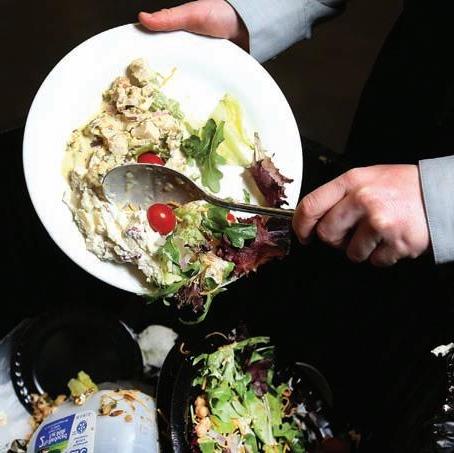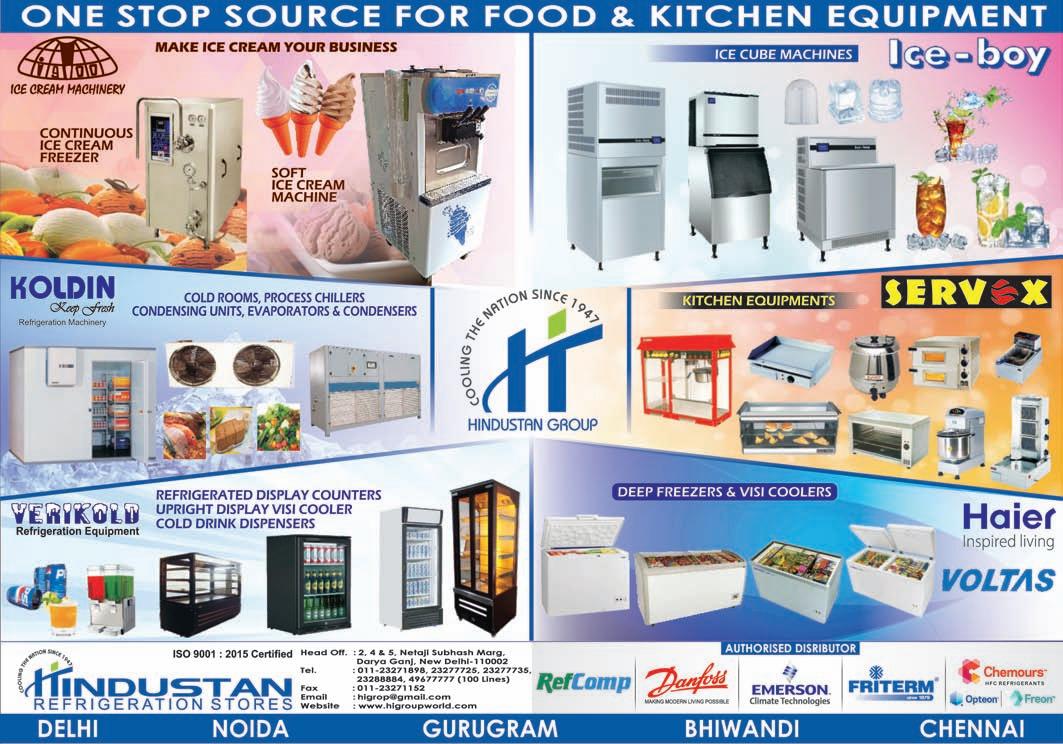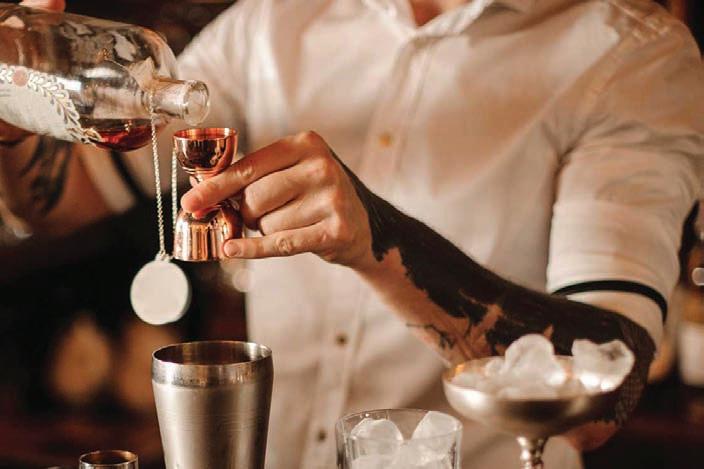
7 minute read
FEATURE
Revival for Restaurant Business
By Jhuma Biswas
Advertisement
Restaurant business in India is slowly recovering from the severe economic jolts it suffered due to successive lockdowns but it would still require some more time for India’s restaurant business to reach pre-Covid levels of revenues and growth.
On end October 2020, The Federation of Hotel and Restaurant Associations of India (FHRAI) wrote to the Prime Minister, appealing for a hospitality-specific relief package for saving India’s hospitality sector from collapsing. The association said that if a favourable policy for survival of India’s hospitality sector was not made then at least 40-50 percent restaurants and 3040 percent hotels in India would have to close shop, resulting in millions of job losses. Already several restaurants have closed down in India resulting in plethora of job losses in the restaurant and bar business of the country.
We cannot have much hope on the callous government at the centre. In the recently tabled Union Budget for the 202122 fiscal, the centre reduced the budgetary allocation for the Ministry of Tourism by 19 percent from Rs. 2,500 crore in 2020-21 to Rs. 2026.77 crore for the forthcoming
fiscal of 2021-22. The reduced budget for tourism does in turn have the serious potential to adversely affect the restaurant business in India. The restaurateurs in India need to help themselves to quicken their revenue growth, which may be reflected in profits too. However, we have to keep in mind that in the present context, majority of restaurants in India would prefer those routes towards revenue and profit growth which require less investment.
Hygiene for Confidence
One of the ways they can help garner more guests is through hygiene route. The restaurants in India should not only adhere to stringent hygiene protocols but should showcase the hygiene protocols that they adhere to through social media platforms. This measure would help to generate more confidence among their potential guests regarding visiting restaurants and some of their potential guests may turn into real guests in the short run.
As lockdowns have weakened the Indian economy, people on an average are having less disposable incomes than before. Restaurants in India should thus slightly reduce their profit margins and provide their food & beverages at slightly discounted prices without reducing the quality of their offerings. This writer believes that by doing so they could easily cover this revenue loss through more sales.
In other words, in this economic climate more people in India would be willing to visit those restaurants which offer their products at discounted prices without discounted quality.
Uncommon Food Festivals
Restaurants in India can generate additional revenues during these trying times through organising food festivals focusing on various uncommon cuisines of India and abroad in the Indian context(such as Nagaland Food Festival, Spanish Food Festival, Greek Food Festival, etc.) and publicising those food festivals through cost-effective social media platforms. These will cater to the growing number of people who are eager to experiment with new uncommon types of cuisine.
Of course, it goes without mention that only those restaurants operating in the organised sector which have some financial muscle can organise food festivals to augment their revenues. Restaurants somehow surviving on the brink of collapse cannot afford to undertake this measure. Moreover, food festivals should be organised while keeping the profile of the restaurant and its clientele in mind.

Reducing Wastage
Restaurants in India can also take a pragmatic step towards their profits by

reducing wastage of food products and other resources in their daily operations. Here it deserves a mention that food wastage is not only morally and ethically wrong, not only does it create huge economic losses but it is also very much detrimental to our fragile environment, which is already struggling with global warming and myriad types of pollution. It is because production, transportation and cooking of food lead to greenhouse gas emissions.
Ordering the right quantity of food stock, always storing food correctly, and paying close attention to use-by dates of food to avoid their expiry, having a close watch on portion to be served, can facilitate in reducing food wastage significantly. Ensuring the right temperature control to maintain the shelf life of food, labelling the food correctly, maintaining a stock inventory of food products are other effective measures to prevent food wastage in restaurants.
At the same time, rewarding guests who do not do any food waste (for example by giving them an extra plate of dessert at a much discounted rate as a reward) can also discourage the baneful practice of food waste in restaurants.
Exploring Digital for Guest Satisfaction
The ongoing digital revolution can be creatively used by the restaurants in these trying times to garner more guests through personalised touch. In this digital age, it is much easier as compared to two decades ago for a restaurateur to keep a history of her/his guests’ food & beverage preferences, feedback on what they liked or disliked in the restaurant, and what they would like to improve in the restaurant, on computer (the process can be initiated by letting the guests fill a short form where their F&B preferences and what they liked or disliked in the restaurant and what they would like to improve in the restaurant would be asked for).
This data base can be used to serve the repeat guests to the restaurants better. For example, if the F&B Manager is already informed about the repeat guests’ food & beverage preferences she/he can direct the waiter to gently suggest those preferences to repeat guests when they arrive at the outlet. This would help the guests to develop an emotional connect with the food service outlet, which can lead to improvement in revenues for the given outlet concerned in the long-run. This personalised touch can immensely help many restaurants in India especially in these times when many of them are struggling to attain the pre-Covid levels of revenues and growth.
Digital wave can not only enhance guest satisfaction on an individual basis but also guest satisfaction as a whole. If from the data base it is deciphered that more number of guests do not like a particular aspect in a restaurant that can be changed quickly. If more number of guests like a particular aspect of a restaurant that can be retained or even heightened, if feasible. Guests’ pragmatic suggestions to improve the restaurant can also be quickly adhered to through digital medium by maintaining a date base of those suggestions.
Succinctly, digital power can facilitate greater involvement of the guests, and this can be creatively explored upon to garner additional revenues for restaurants.

Edible Cutlery
In these health and environmentconscious times, those restaurants in India’s food service industry which offer environmentally-friendly options in their operations are expected to get an extra market edge.
One of the uncommon environmental measures that restaurants can adopt is the usage of edible cutlery. Edible cutlery can not only address the environmental problem inherent in the use of plastic cutlery, but it can be more convenient to use and dispose than their plastic versions, which can easily offset this market advantage of plastic cutlery. You can eat with them and eat them too…And even if you do not want to eat them and dispose them in your stomach then also they can be decomposed within days; not decompose through span of centuries like plastic.
However, it is always preferable to make the edible cutlery with those ingredients whose production doesn’t require much water. Otherwise the sustainable edge of edible cutlery would be diminished. If edible cutlery is spruced with healthy ingredients, it can add value to the menu of restaurants in India, especially in these increasingly health conscious times.
Guest Bartender
Involving the interested guests in creating customised cocktails and in wine and food pairing can also be one of the intelligent methods to attract more guests to your outlet. A great many guests would like personal involvement in developing their choice of cocktail with able expert guidance from the concerned bartender/s. Due credit to the guests involved in making their customised cocktail/s can also be acknowledged in the restaurants with urging the other guests to clap to recognise the cocktail making guests. Their guests’ role in creating customised cocktails can also be showcased in restaurants’ social media platforms.
Here it must be mentioned that adopting one of the above-mentioned measures would probably not lead to quick revival of restaurant business in India but the exercise of a combination of all of these measures has a high probability for quickening the process of an affected restaurant’s revival to the pre-Covid levels of revenues and growth. n











